国际关系著作汉斯摩根索六原则
浅析西方三大主流国际关系理论
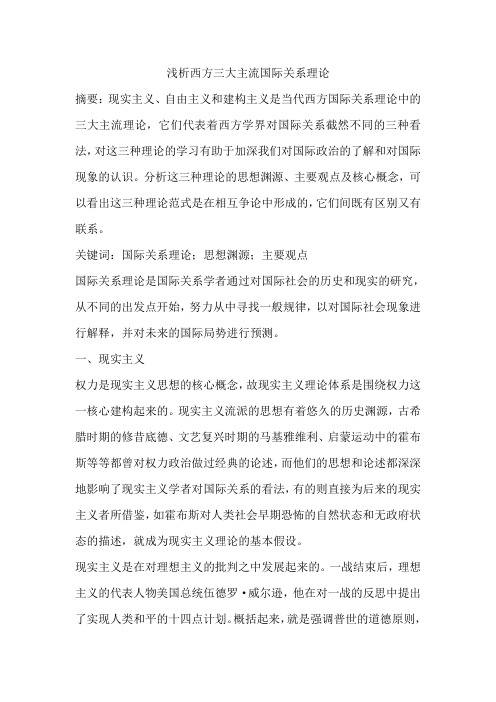
浅析西方三大主流国际关系理论摘要:现实主义、自由主义和建构主义是当代西方国际关系理论中的三大主流理论,它们代表着西方学界对国际关系截然不同的三种看法,对这三种理论的学习有助于加深我们对国际政治的了解和对国际现象的认识。
分析这三种理论的思想渊源、主要观点及核心概念,可以看出这三种理论范式是在相互争论中形成的,它们间既有区别又有联系。
关键词:国际关系理论;思想渊源;主要观点国际关系理论是国际关系学者通过对国际社会的历史和现实的研究,从不同的出发点开始,努力从中寻找一般规律,以对国际社会现象进行解释,并对未来的国际局势进行预测。
一、现实主义权力是现实主义思想的核心概念,故现实主义理论体系是围绕权力这一核心建构起来的。
现实主义流派的思想有着悠久的历史渊源,古希腊时期的修昔底德、文艺复兴时期的马基雅维利、启蒙运动中的霍布斯等等都曾对权力政治做过经典的论述,而他们的思想和论述都深深地影响了现实主义学者对国际关系的看法,有的则直接为后来的现实主义者所借鉴,如霍布斯对人类社会早期恐怖的自然状态和无政府状态的描述,就成为现实主义理论的基本假设。
现实主义是在对理想主义的批判之中发展起来的。
一战结束后,理想主义的代表人物美国总统伍德罗·威尔逊,他在对一战的反思中提出了实现人类和平的十四点计划。
概括起来,就是强调普世的道德原则,重视国际组织、国际法和国际舆论的作用,主张自由贸易、民主体制和民族自决,由此主张建立国际联盟。
卡尔于1939年出版了其代表作《二十年危机,1919-1939:国际关系研究导论》,在书中卡尔针对理想主义,明确指出理想主义思潮和活动掩盖了国际关系的本质,从一战到二战之间是危机四伏的二十年,在一种近乎无政府状态的国际社会中很难界定普世的道德原则,而权力是国际关系中至关重要的因素,没有国家权力,国际组织就软弱无力,理想主义提出的只是国际社会的“应然”状态,而现实的国际社会是处于无政府状态下的各国为保证自身的生存而展开的激烈的权力争夺。
国际关系的主要理论

《国际关系的主要理论及其影响》国际关系是一个复杂而多元的领域,各种理论从不同角度解释国家间的互动、冲突与合作。
了解这些主要理论,有助于我们更好地理解国际政治的运行机制和未来走向。
一、现实主义理论现实主义是国际关系中最具影响力的理论之一。
现实主义强调国家是国际政治的主要行为体,国家的核心目标是追求权力和安全。
在现实主义者看来,国际体系处于无政府状态,没有一个凌驾于国家之上的权威机构来维持秩序。
因此,国家必须依靠自身的实力来保护自己的利益。
现实主义的代表人物有汉斯·摩根索等。
摩根索提出了“政治现实主义六原则”,其中包括政治受根植于人性的客观法则所支配、以权力定义利益等。
现实主义认为国家在追求权力的过程中会采取各种手段,包括战争、结盟等。
现实主义理论在国际关系中具有重要的现实意义。
它提醒各国在国际事务中要保持警惕,注重自身实力的提升。
同时,现实主义也为国家制定外交政策提供了一种务实的思路,即根据国家利益来权衡各种选择。
二、自由主义理论自由主义与现实主义相对,强调国际合作的可能性和重要性。
自由主义认为国家并非完全自私自利的行为体,它们可以通过合作来实现共同利益。
自由主义者主张建立国际制度和机构,以规范国家行为,促进国际合作。
自由主义的代表理论有相互依赖理论、民主和平论等。
相互依赖理论认为,随着经济全球化的发展,国家之间的相互依赖程度不断加深,这使得国家更加倾向于通过合作来解决问题。
民主和平论则认为,民主国家之间很少发生战争,因为民主国家具有共同的价值观和制度,能够通过和平方式解决争端。
自由主义理论为国际合作提供了理论支持,推动了国际组织和多边机制的发展。
例如,联合国、世界贸易组织等国际机构在促进国际合作、维护世界和平方面发挥了重要作用。
三、建构主义理论建构主义是一种相对较新的国际关系理论。
建构主义强调观念、文化和身份在国际政治中的重要性。
建构主义者认为,国家的利益和行为不是由物质因素决定的,而是由国家的观念和身份所建构的。
外交学院·《思想·范式·命题》国际关系理论精品讲义

一.理论·范式·命题1.理论【概念】:对规律的解释,包括变量和变量关系的分析,具体表现为分析变量间的因果、建构等关系。
理论一般可分为两类,即“规范性理论”和“描述性理论”。
规范性理论指以未来的价值导向为基础,以目的为起点通常通过逻辑思辨来研究“应然”问题的学说。
此类学说在国际关系理论中大多表现为与政策、战略细细相关的理论流派;而描述性理论则是指通过对研究对象(现象)大量的观察、实验和调查,获取客观材料,提炼出概念,归纳出现象的本质属性并发现规律,同时使用实证主义的方法对规律进行严格验证和分析,如三大体系理论便是科学性很高的描述性理论。
此外,应当注意国关理论中的某些理论的研究,基于现象的提炼得出概念,但并没有严格的坚持实证主义验证方法,而是坚持的逻辑思辨的证明方法。
如文明冲突论、国际机制论等。
【作用】:1.提供认识世界框架。
2.提供一个逻辑一致的因果解释。
3.帮助预测未来。
4.为政策制定提供帮助。
【理论演变】——五次大辩论1.国际关系学科产生与理想主义。
动因:第一次世界大战结束,对战争的反思及战争原因的探索是导致国际关系学科产生的直接原因。
主流思想:“理想主义”:又被称为“威尔逊主义”。
1918年威尔逊提出“十四点计划”,集中反映了他的理想主义思想。
威尔逊理想主义的核心有两点:一是强调民族自决和民主制度;二是主张建立国联维护集体安全。
从理论角度讲,理想主义是第一阶段国际关系的主导理念,考虑的是“应然”的问题,就是世界应该是什么样子;在方法论方面,国际关系远未形成自己的方法论体系,主要是借鉴历史学和国际法的研究方法。
2.第一次大辩论:现实主义挑战理想主义(标准:本体论——国际社会本质的认识,物质主义OR理念主义)现实主义:代表人物:爱德华·卡尔;代表作《二十年危机》;主要观点:1.批判“理想主义”把“应然”当做“实然”;2.对权力重新重视;3.道德以国家利益为衡量标准,坚持道德相对主义;4.认为国家利益矛盾是造成冲突的重要原因,坚持利益冲突论。
当代西方国际关系理论笔记

1. P4理论的功能:戴维辛格(David Singer)认为,理论是一个内部相互联系的、实证概括的分析整体,它拥有描述、解释和预测的功能。
罗伯特利柏(Robert Lieber):第一,描述。
理论必须确切地描述现实世界发生的事件。
第二,解释。
理论应对说明这些事件发生的因果,说明“行为规律”和进行“评估分析”。
在一个特定的体系里,理论解释事物的“连续性、反复性和规律性”。
第三,预测。
一般来说,是预测“事物发展和结果发生的模式或总趋势,是事物的未来的发展,而不是具体事件的发生”2. P6理论与历史:雷蒙阿隆:历史是过去的政治,理论的实质是历史。
约瑟夫奈:国际关系史不是国关理论,但国际关系史为国际关系研究提供来意提炼升华为理论的原始材料和现实基础。
要处理好理论与历史的关系,必须把握住三个基本观点:第一,理论是历史的产物,历史是理论的基础。
第二,理论是一种思维的科学,其本质是历史。
第三,检验理论的标准是实践。
3. 国际关系理论及国际关系的定义:P7国际关系理论意指研究各种国与国之间关系的科学分析框架和理论体系。
P8汉斯摩根索:国际关系是“处于权力斗争的国家之间的关系,其实质是权力政治”。
P8昆西赖特:国际关系意指民族、国家、政府和人民之间的关系。
国际关系理论则是全面叙述、解释、评价、预测世界上不同政治社会关系的研究项目或学科。
P8欧奈斯特莱弗沃:国际关系是关于主权国家之间权力对权力、利益对利益、目标对目标的长期斗争。
P9斯坦利霍夫曼:IR实质是国家之间关系的政治。
IRT是关于影响世界基本单位的对外政策和权力地位的因素和活动的学科。
P9弗里德里克邓:国际关系是指世界体系内各个政治集体或实体之间的复杂关系,其核心是权力问题。
IRT则是“关于那些跨国的关系的只是总和”。
P9查尔斯麦克兰德:IRT是关于“世界上有组织社会实体互动关系的研究”,包括对这些互动关系的有感环境的研究。
P9卡尔多伊奇:IRT应研究民族国家之间不可避免的相互依存和民族国家缺少控制能力的问题。
国关理论【一】(人物名词解释)
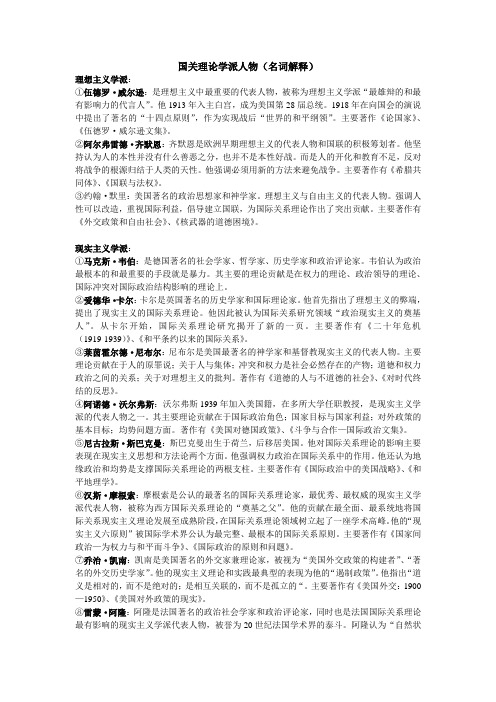
国关理论学派人物(名词解释)理想主义学派:①伍德罗·威尔逊:是理想主义中最重要的代表人物,被称为理想主义学派“最雄辩的和最有影响力的代言人”。
他1913年入主白宫,成为美国第28届总统。
1918年在向国会的演说中提出了著名的“十四点原则”,作为实现战后“世界的和平纲领”。
主要著作《论国家》、《伍德罗·威尔逊文集》。
②阿尔弗雷德·齐默恩:齐默恩是欧洲早期理想主义的代表人物和国联的积极筹划者。
他坚持认为人的本性并没有什么善恶之分,也并不是本性好战。
而是人的开化和教育不足,反对将战争的根源归结于人类的天性。
他强调必须用新的方法来避免战争。
主要著作有《希腊共同体》、《国联与法权》。
③约翰·默里:美国著名的政治思想家和神学家。
理想主义与自由主义的代表人物。
强调人性可以改造,重视国际利益,倡导建立国联,为国际关系理论作出了突出贡献。
主要著作有《外交政策和自由社会》、《核武器的道德困境》。
现实主义学派:①马克斯·韦伯:是德国著名的社会学家、哲学家、历史学家和政治评论家。
韦伯认为政治最根本的和最重要的手段就是暴力。
其主要的理论贡献是在权力的理论、政治领导的理论、国际冲突对国际政治结构影响的理论上。
②爱德华·卡尔:卡尔是英国著名的历史学家和国际理论家。
他首先指出了理想主义的弊端,提出了现实主义的国际关系理论。
他因此被认为国际关系研究领域“政治现实主义的奠基人”。
从卡尔开始,国际关系理论研究揭开了新的一页。
主要著作有《二十年危机(1919-1939)》、《和平条约以来的国际关系》。
③莱茵霍尔德·尼布尔:尼布尔是美国最著名的神学家和基督教现实主义的代表人物。
主要理论贡献在于人的原罪说;关于人与集体;冲突和权力是社会必然存在的产物;道德和权力政治之间的关系;关于对理想主义的批判。
著作有《道德的人与不道德的社会》、《对时代终结的反思》。
④阿诺德·沃尔弗斯:沃尔弗斯1939年加入美国籍,在多所大学任职教授,是现实主义学派的代表人物之一。
汉斯?摩根索现实主义六原则
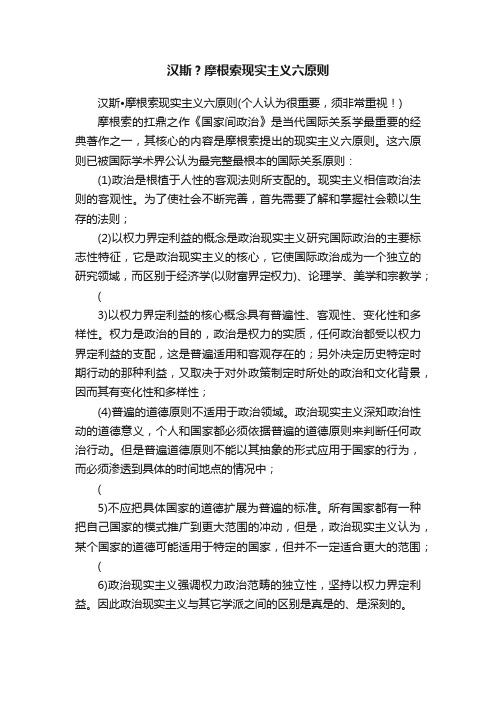
汉斯?摩根索现实主义六原则
汉斯•摩根索现实主义六原则(个人认为很重要,须非常重视!)
摩根索的扛鼎之作《国家间政治》是当代国际关系学最重要的经典著作之一,其核心的内容是摩根索提出的现实主义六原则。
这六原则已被国际学术界公认为最完整最根本的国际关系原则:
(1)政治是根植于人性的客观法则所支配的。
现实主义相信政治法则的客观性。
为了使社会不断完善,首先需要了解和掌握社会赖以生存的法则;
(2)以权力界定利益的概念是政治现实主义研究国际政治的主要标志性特征,它是政治现实主义的核心,它使国际政治成为一个独立的研究领域,而区别于经济学(以财富界定权力)、论理学、美学和宗教学;
(
3)以权力界定利益的核心概念具有普遍性、客观性、变化性和多样性。
权力是政治的目的,政治是权力的实质,任何政治都受以权力界定利益的支配,这是普遍适用和客观存在的;另外决定历史特定时期行动的那种利益,又取决于对外政策制定时所处的政治和文化背景,因而其有变化性和多样性;
(4)普遍的道德原则不适用于政治领域。
政治现实主义深知政治性动的道德意义,个人和国家都必须依据普遍的道德原则来判断任何政治行动。
但是普遍道德原则不能以其抽象的形式应用于国家的行为,而必须渗透到具体的时间地点的情况中;
(
5)不应把具体国家的道德扩展为普遍的标准。
所有国家都有一种把自己国家的模式推广到更大范围的冲动,但是,政治现实主义认为,某个国家的道德可能适用于特定的国家,但并不一定适合更大的范围;
(
6)政治现实主义强调权力政治范畴的独立性,坚持以权力界定利益。
因此政治现实主义与其它学派之间的区别是真是的、是深刻的。
汉斯 摩根索

摩根索对国际政治研究的影响是由于他对哲学和政治学的双重重视。他的政治现实主义理论对国际关系学的 发展具有重要的意义,对美国外交政策基本原则的制订产生了重大影响。
政治现实主义的六项原则
第一,现实主义深信政治法则的客观性,政治受到植根于人性的客观规律的支配。这些规律不能改变,所以 要想变革社会,就必须首先认识这些社会规律,然后以这些认识为依据制定公共政策。
摩根索在芝加哥大学任教授时,与爱德华·卡尔成为同事,此人是现实主义学派的主要代表人物之一。该学 派认为民族国家是国际关系的主要行为体,其最为**的研究领域是权力。
平生所著甚多,但最著名的传世之作则是《国家间政治—权力斗争与和平》(Politics Among NationsThe Struggle for Power and Peace),该书在学术界素享盛誉,已经成为美国使用最广影响最大的教科书之 一,它精确地定义了国际关系范畴,宣告了美国二战后外交思想范式转型的开始,该文强调权力界定的利益。而 在二战前理想主义占据主流的时期,人们**的则是价值。其他主要著作还有《科学人对抗权力政治》(1946年)、 《捍卫国家利益》(1951年)、《政治学的困境》(1958年)、《美国政治的目的》(1960)、《20世纪的政治 学》(1962)、《真理与强权》(1970)、《科学:奴仆还是主人?》等。
国家间政治权力与和平读书笔记
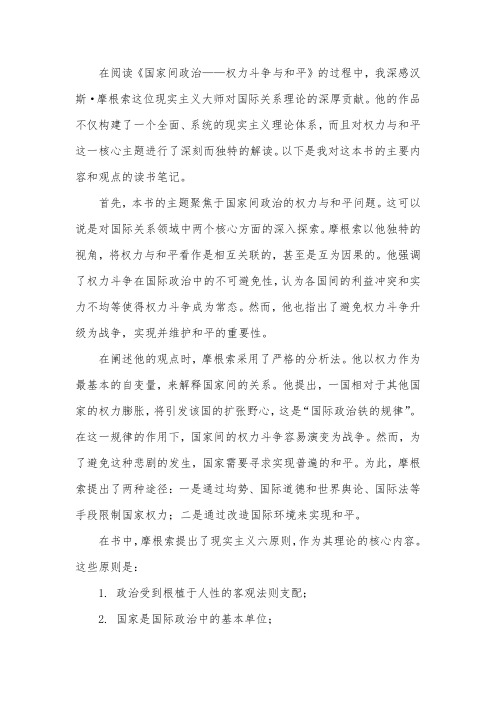
在阅读《国家间政治——权力斗争与和平》的过程中,我深感汉斯·摩根索这位现实主义大师对国际关系理论的深厚贡献。
他的作品不仅构建了一个全面、系统的现实主义理论体系,而且对权力与和平这一核心主题进行了深刻而独特的解读。
以下是我对这本书的主要内容和观点的读书笔记。
首先,本书的主题聚焦于国家间政治的权力与和平问题。
这可以说是对国际关系领域中两个核心方面的深入探索。
摩根索以他独特的视角,将权力与和平看作是相互关联的,甚至是互为因果的。
他强调了权力斗争在国际政治中的不可避免性,认为各国间的利益冲突和实力不均等使得权力斗争成为常态。
然而,他也指出了避免权力斗争升级为战争,实现并维护和平的重要性。
在阐述他的观点时,摩根索采用了严格的分析法。
他以权力作为最基本的自变量,来解释国家间的关系。
他提出,一国相对于其他国家的权力膨胀,将引发该国的扩张野心,这是“国际政治铁的规律”。
在这一规律的作用下,国家间的权力斗争容易演变为战争。
然而,为了避免这种悲剧的发生,国家需要寻求实现普遍的和平。
为此,摩根索提出了两种途径:一是通过均势、国际道德和世界舆论、国际法等手段限制国家权力;二是通过改造国际环境来实现和平。
在书中,摩根索提出了现实主义六原则,作为其理论的核心内容。
这些原则是:1. 政治受到根植于人性的客观法则支配;2. 国家是国际政治中的基本单位;3. 国家间的竞争是基本的互动方式;4. 权力界定利益;5. 现实主义寻求和平;6. 政治受到国内和国际政治的双重影响。
这些原则为我们理解国际关系提供了宝贵的视角,也为我们制定外交政策提供了有益的指导。
在总结本书的主要观点时,我们可以看到摩根索的现实主义理论不仅揭示了国际政治的本质——权力斗争,还为寻求世界和平的途径提供了独特的见解。
他的理论框架清晰、全面,具有深远的影响力。
在阅读这本书的过程中,我深感其理论的价值和意义。
它提醒我们,在复杂的国际关系中,权力的平衡和制约至关重要。
国际关系理论随笔

国际关系理论的发展主要以三次论战为脉络,在争论过程中不断完善和前进。
所关注的主体也由最初的战争与和平的一元向和平与发展,经济,文化,环境等问题。
第一次论战在20世纪初第一次世界大战给欧洲和相关国家带了了灾难,人们都在思考如何避免这种灾难的发生,寻求解决的办法。
理想主义作为一种思潮得以兴起。
理想主义者主张通过规范和法律来调和国家之间的利益和行为,认为国家间是可以合作的。
主要代表人物是时任美国总统伍德罗威尔逊,他在第十四点原则中正式表达了自己理想主义的主张。
具体包括,人性本善,可以通过教育改善;建立国际联盟,超国家组织,来协调国家间事务。
建立国际法和国际组织。
集体安全,建立我为人人,人人为我的国际安全体系。
预防和制止集团内或集体外的不安全因素。
人性本善,集体安全,国际规范和国际法,国际联盟。
1939年卡尔,在《二十年危机(1919-1939》中强烈的抨击了理想主义,并将理想主义定位乌邦托主义,批评了它不切实际,理想主义关注世界应该是怎么样,忽视了现实世界。
过度关注“应然”而没有认真的研究“实然”。
第二次世界大战的爆发,彻底宣布了理想主义的破产。
现实主义的思想渊源可以追溯到古希腊修息底德《伯罗奔尼撒战争史》,文艺复兴时期意大利马基雅弗利和英国哲学家霍布斯等早期的社会学著作。
卡尔的《二十年危机》为现实主义奠定了基础。
因此卡尔也被称为现实主义的奠基人。
具体内容主要包括,国际体系处于无政府状态,或者为霍布斯状态,人人为战。
安全是国家追求的目的。
权力是国家追求的目的和手段。
合作是有限度和脆弱的。
国家是国际关系中的主要行为体。
均势是国际体系保持稳定状态的可行模式。
汉斯摩根索,是国际关系学领域公认的现实主义大师,在他的《国家间政治》系统的论述了现实主义,这使得现实主义从一种思潮发展成熟为一种理论。
在该书中,摩根索罗列了一系列的现实主义六原则等总结性的论述,形成了现实主义的理论架构。
他从人性出发,从人性自私,天生追求权力,拓展到国家,类个人的行为,国家也是追求权力。
《国家间的政治——权力斗争与和平》读后笔记 第一二编
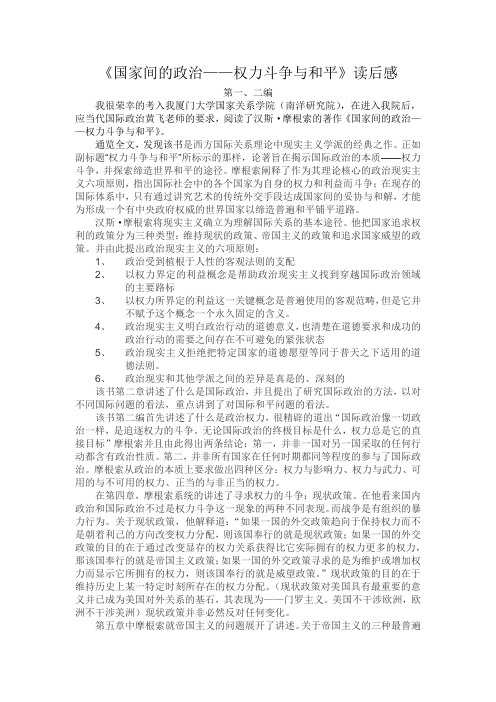
《国家间的政治——权力斗争与和平》读后感第一、二编我很荣幸的考入我厦门大学国家关系学院(南洋研究院),在进入我院后,应当代国际政治黄飞老师的要求,阅读了汉斯·摩根索的著作《国家间的政治——权力斗争与和平》。
通览全文,发现该书是西方国际关系理论中现实主义学派的经典之作。
正如副标题“权力斗争与和平”所标示的那样,论著旨在揭示国际政治的本质——权力斗争,并探索缔造世界和平的途径。
摩根索阐释了作为其理论核心的政治现实主义六项原则,指出国际社会中的各个国家为自身的权力和利益而斗争;在现存的国际体系中,只有通过讲究艺术的传统外交手段达成国家间的妥协与和解,才能为形成一个有中央政府权威的世界国家以缔造普遍和平铺平道路。
汉斯·摩根索将现实主义确立为理解国际关系的基本途径。
他把国家追求权利的政策分为三种类型:维持现状的政策、帝国主义的政策和追求国家威望的政策。
并由此提出政治现实主义的六项原则:1、政治受到植根于人性的客观法则的支配2、以权力界定的利益概念是帮助政治现实主义找到穿越国际政治领域的主要路标3、以权力所界定的利益这一关键概念是普遍使用的客观范畴,但是它并不赋予这个概念一个永久固定的含义。
4、政治现实主义明白政治行动的道德意义,也清楚在道德要求和成功的政治行动的需要之间存在不可避免的紧张状态5、政治现实主义拒绝把特定国家的道德愿望等同于普天之下适用的道德法则。
6、政治现实和其他学派之间的差异是真是的、深刻的该书第二章讲述了什么是国际政治,并且提出了研究国际政治的方法,以对不同国际问题的看法,重点讲到了对国际和平问题的看法。
该书第二编首先讲述了什么是政治权力,很精辟的道出“国际政治像一切政治一样,是追逐权力的斗争。
无论国际政治的终极目标是什么,权力总是它的直接目标”摩根索并且由此得出两条结论:第一,并非一国对另一国采取的任何行动都含有政治性质。
第二,并非所有国家在任何时期都同等程度的参与了国际政治。
国际关系理论全集

国际关系理论全集一、导论国际关系(international Relations)指国际社会中一切成员跨越国界的互动关系。
包括三个不同范围的领域。
第一是国际关系,指任何成员的确任何跨国界关系,包括国家、国际组织、乃至个人之间的跨国界互动关系。
第二是国际政治,主要指权威国际成员之间的关系,核心是国家间关系。
第三是对外政策,指一个国家对于其他国家或组织制定和实施的政策。
三者构成同心圆:国际关系范围最大,国际政治次之,仅包括国际关系中官方关系部分,主要考虑国家间关系,对外政策的确范围最小。
民族国家(nation-state)是现代国家形态,具有四个要素:定居的人民、固定的领土、有权统治人民和领土的政府、主权(国际承认)(对内最高统治权,对外平等权)。
共同体的核心基础是政治文化认同,种族、血缘、经济、关系都在下降,而文化认同的核心是语言、文化倾向、生活地域关系。
民族主义(nationalism)是一种思想感情,即忠诚于操共同语言和具有共同历史传统的集团,关注其命运的发展。
理论(theory)是对现象的有规律联系的解释。
规律是静态的;理论是动态的,是人类主观建构的结果,处于变化之中。
因此,要发现规律,创造理论,而不是相反。
理论的基本功能:(1)描述(describe):切实描述现实世界发生的事情;(2)解释(account for,说明原因和理由):理论超越所观察的对象,解释事物的“连续性、反复性和规律性”。
(表现形式:如果……那么)例子:军备竞赛---战争;(3)预测(calculate):理论具有概然的预测力,预测事物的发展趋势,而非具体事件。
层次分析法是国际关系研究中一种比较行之有效的科学研究方法。
美国学者肯尼思·华尔兹(Kenneth Waltz)较早地使用了层次分析法。
在他探讨战争原因的著作《人、国家与战争》(Man, the States and War,1959)中,华尔兹认为战争的爆发与三个层次上的因素有关,即他提出的3个著名“意象”(image),即国际关系分析层次——决策者个人因素,国家内部因素和国际体系因素。
请列举出摩根索政治现实主义的六个原则:

请列举出摩根索政治现实主义的六个原则:
1. 实用主义:政治行动应注重效率和实用性,而非理想主义的表现和信仰。
政治活动家需要关注公众的实际需求和现实的限制。
2. 原则性:政治活动应该基于一些基本准则,如法治、人权、自由、公正、平等和民主。
政治活动家应该坚定地坚持这些准则,而不是为了个人的利益而忽视它们。
3. 实用主义与道德之间的平衡:摩根索主张政治人物应该考虑行动的实用性和道德性之间的平衡。
这意味着他们应该考虑到自己行动的影响,尽可能地坚持道德准则,同时注重实际成效。
4. 经验主义:政治行动应该基于对历史和现实的经验和观察,而非空想和理论。
政治活动家应该注重事实和真相,而不是陷入虚构的幻想之中。
5. 实证主义:政治行动应建立在客观的实证研究和证据之上,而非主观的感觉和猜测。
政治活动家应认真研究数据和信息,以便更好地了解问题的本质,从而作出更明智和有效的决策。
6. 理性主义:政治活动应该基于理性的思考和逻辑推理,而非情感和偏见。
政治活动家应该避免在决策过程中受到情绪和情感的影响,而是应该根据客观事实
进行判断和决策。
当代西方国际关系理论
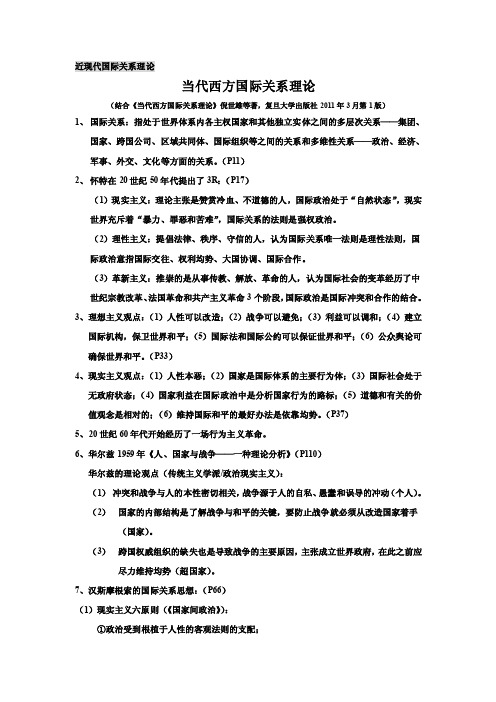
近现代国际关系理论当代西方国际关系理论(结合《当代西方国际关系理论》倪世雄等著,复旦大学出版社2011年3月第1版)1、国际关系:指处于世界体系内各主权国家和其他独立实体之间的多层次关系——集团、国家、跨国公司、区域共同体、国际组织等之间的关系和多维性关系——政治、经济、军事、外交、文化等方面的关系。
(P11)2、怀特在20世纪50年代提出了3R:(P17)(1)现实主义:理论主张是赞赏冷血、不道德的人,国际政治处于“自然状态”,现实世界充斥着“暴力、罪恶和苦难”,国际关系的法则是强权政治。
(2)理性主义:提倡法律、秩序、守信的人,认为国际关系唯一法则是理性法则,国际政治意指国际交往、权利均势、大国协调、国际合作。
(3)革新主义:推崇的是从事传教、解放、革命的人,认为国际社会的变革经历了中世纪宗教改革、法国革命和共产主义革命3个阶段,国际政治是国际冲突和合作的结合。
3、理想主义观点:(1)人性可以改造;(2)战争可以避免;(3)利益可以调和;(4)建立国际机构,保卫世界和平;(5)国际法和国际公约可以保证世界和平;(6)公众舆论可确保世界和平。
(P33)4、现实主义观点:(1)人性本恶;(2)国家是国际体系的主要行为体;(3)国际社会处于无政府状态;(4)国家利益在国际政治中是分析国家行为的路标;(5)道德和有关的价值观念是相对的;(6)维持国际和平的最好办法是依靠均势。
(P37)5、20世纪60年代开始经历了一场行为主义革命。
6、华尔兹1959年《人、国家与战争——一种理论分析》(P110)华尔兹的理论观点(传统主义学派/政治现实主义):(1)冲突和战争与人的本性密切相关,战争源于人的自私、愚蠢和误导的冲动(个人)。
(2)国家的内部结构是了解战争与和平的关键,要防止战争就必须从改造国家着手(国家)。
(3)跨国权威组织的缺失也是导致战争的主要原因,主张成立世界政府,在此之前应尽力维持均势(超国家)。
国际关系学

国际关系学西方国际政治学理论的主要流派跨国主义学派与现实主义的不同:强调国际合作与互信而不是权力斗争强调国际法、国际组织和国际制度而不是国际无政府状态(强调秩序)强调相互依赖、集体安全和利益和谐而不是自助国际秩序得以建立的条件①国际机构的作用:国家形象的体现、国际制裁、国家交际的场合②国际行为规范和规则的约束③国家间日益发展的经济相互依存④全球技术进步和通讯手段的发展理想主义(规范主义理论)伍德罗威尔逊理论:通过国际合作,建立国际法和国际组织,能够规范国家的行为,制止侵略,实现国际和平在国际法和特定规范基础上建立的国际共同体和国际制度促进跨国联系,从而缓和甚至消除权力政治的需要。
不同于权力平衡,集体安全可以通过强制实施的秩序制裁威胁现状的国家和国家集团。
赫德利·布尔《无政府社会》书:哲学观点上主张人性善,政治观点上崇尚国家和世界的民主化和法制化,主张恢复国际规范,建立国际普遍安全机构,完善国际法及其职能,加强国家间的相互合作,用理性战胜邪恶,最终实现一种和平稳定的世界秩序,避免世界战争重演。
现实主义修昔底德,马基雅弗利,霍布斯【英】爱德华·H·卡尔《20年危机(1919-1939):国际关系研究导论》汉斯·摩根索《国家间政治-寻求权力与和平的斗争》【法】雷蒙·阿隆《和平与战争:一种国际关系理论》核心概念:权力,利益理论:①国际体系是无政府暴力与战争是作为自然状态的普遍现象,国际政治是非合作游戏②在无政府为特征的体系中,主要行为体是作为整体单位的国家,决定因素是国际体系的性质和国家实力③权力是理解国际关系的关键④国家是理性的行为者与理想主义的不同:①政治哲学观赏崇尚人性恶,要建立一定的政治机制去限制②伦理观点上,抽象的道德原则不适用于政治行为,国际社会的无政府状态使作为国家利益代表的政治家的行为准则,与文明争体内的个人行为准则根本不同③和政治权力和利益相比,国际组织的和国际法的作用微不足道④国际政治学理论的任务是要说明世纪的客观现状,面对现实,为谋求本国的权利和利益而斗争。
国家间政治——读书报告
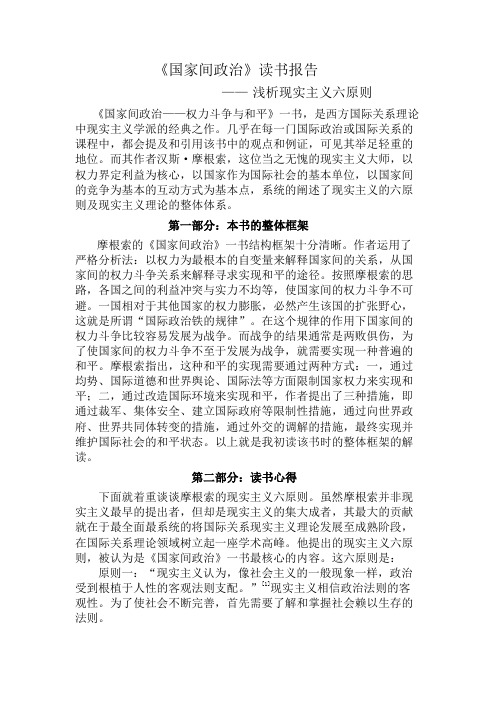
《国家间政治》读书报告——浅析现实主义六原则《国家间政治——权力斗争与和平》一书,是西方国际关系理论中现实主义学派的经典之作。
几乎在每一门国际政治或国际关系的课程中,都会提及和引用该书中的观点和例证,可见其举足轻重的地位。
而其作者汉斯·摩根索,这位当之无愧的现实主义大师,以权力界定利益为核心,以国家作为国际社会的基本单位,以国家间的竞争为基本的互动方式为基本点,系统的阐述了现实主义的六原则及现实主义理论的整体体系。
第一部分:本书的整体框架摩根索的《国家间政治》一书结构框架十分清晰。
作者运用了严格分析法:以权力为最根本的自变量来解释国家间的关系,从国家间的权力斗争关系来解释寻求实现和平的途径。
按照摩根索的思路,各国之间的利益冲突与实力不均等,使国家间的权力斗争不可避。
一国相对于其他国家的权力膨胀,必然产生该国的扩张野心,这就是所谓“国际政治铁的规律”。
在这个规律的作用下国家间的权力斗争比较容易发展为战争。
而战争的结果通常是两败俱伤,为了使国家间的权力斗争不至于发展为战争,就需要实现一种普遍的和平。
摩根索指出,这种和平的实现需要通过两种方式:一,通过均势、国际道德和世界舆论、国际法等方面限制国家权力来实现和平;二,通过改造国际环境来实现和平,作者提出了三种措施,即通过裁军、集体安全、建立国际政府等限制性措施,通过向世界政府、世界共同体转变的措施,通过外交的调解的措施,最终实现并维护国际社会的和平状态。
以上就是我初读该书时的整体框架的解读。
第二部分:读书心得下面就着重谈谈摩根索的现实主义六原则。
虽然摩根索并非现实主义最早的提出者,但却是现实主义的集大成者,其最大的贡献就在于最全面最系统的将国际关系现实主义理论发展至成熟阶段,在国际关系理论领域树立起一座学术高峰。
他提出的现实主义六原则,被认为是《国家间政治》一书最核心的内容。
这六原则是:原则一:“现实主义认为,像社会主义的一般现象一样,政治受到根植于人性的客观法则支配。
《国际关系理论》重点整理
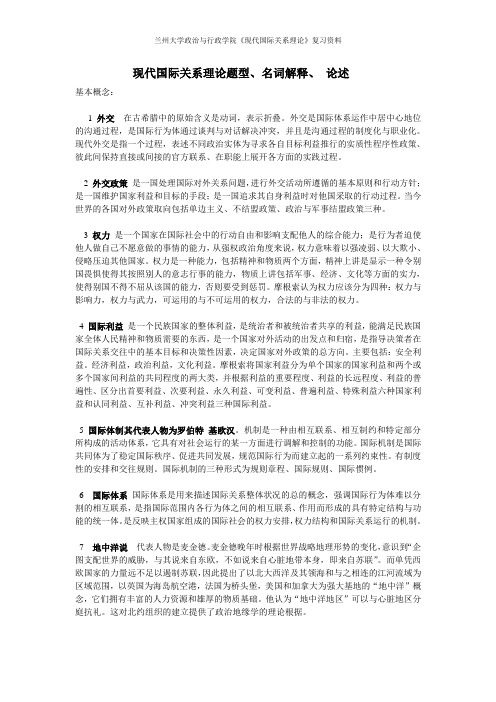
现代国际关系理论题型、名词解释、论述基本概念:1 外交在古希腊中的原始含义是动词,表示折叠。
外交是国际体系运作中居中心地位的沟通过程,是国际行为体通过谈判与对话解决冲突,并且是沟通过程的制度化与职业化。
现代外交是指一个过程,表述不同政治实体为寻求各自目标利益推行的实质性程序性政策、彼此间保持直接或间接的官方联系、在职能上展开各方面的实践过程。
2 外交政策是一国处理国际对外关系问题,进行外交活动所遵循的基本原则和行动方针;是一国维护国家利益和目标的手段;是一国追求其自身利益时对他国采取的行动过程。
当今世界的各国对外政策取向包括单边主义、不结盟政策、政治与军事结盟政策三种。
3 权力是一个国家在国际社会中的行动自由和影响支配他人的综合能力;是行为者迫使他人做自己不愿意做的事情的能力,从强权政治角度来说,权力意味着以强凌弱、以大欺小、侵略压迫其他国家。
权力是一种能力,包括精神和物质两个方面,精神上讲是显示一种令别国畏惧使得其按照别人的意志行事的能力,物质上讲包括军事、经济、文化等方面的实力,使得别国不得不屈从该国的能力,否则要受到惩罚。
摩根索认为权力应该分为四种:权力与影响力,权力与武力,可运用的与不可运用的权力,合法的与非法的权力。
4国际利益是一个民族国家的整体利益,是统治者和被统治者共享的利益,能满足民族国家全体人民精神和物质需要的东西,是一个国家对外活动的出发点和归宿,是指导决策者在国际关系交往中的基本目标和决策性因素,决定国家对外政策的总方向。
主要包括:安全利益。
经济利益,政治利益,文化利益。
摩根索将国家利益分为单个国家的国家利益和两个或多个国家间利益的共同程度的两大类,并根据利益的重要程度、利益的长远程度、利益的普遍性、区分出首要利益、次要利益、永久利益、可变利益、普遍利益、特殊利益六种国家利益和认同利益、互补利益、冲突利益三种国际利益。
5国际体制其代表人物为罗伯特基欧汉。
机制是一种由相互联系、相互制约和特定部分所构成的活动体系,它具有对社会运行的某一方面进行调解和控制的功能。
国家间政治》

第六,政治现实主义和其他学派的区 别是客观存在,同时又是深远的。政 治现实主义理论无论被怎样误解和误 读,其对政治事务的鲜明的学术和道 德态度都是无可否认的。
Байду номын сангаас
.
第四,政治现实主义意识到政治行为中 道德的重要性。它也同样意识到成功的 政治行为与道德要求之间存在着不可避 免的矛盾。它不愿意通过使政治事务中 显而易见的事实看上去比实际情况更具 道德满意度,和使道德法则看上去少些 严厉的政治意味来掩盖或抹去政治与道 德的矛盾,从而将二者的关系模糊化。
.
第五,政治现实主义拒绝以通用的道德 法则来判断某一具体国家在道德上的诉求。 了解各个国家必须遵循道德法则是一回事, 而要诡称通晓国家间关系中的好与恶则完 全是另外一回事。
《国家间政治》
——现实主义六原
则
09121062
《国家间政治》简介
《国家间政治》一书,是西方国际关系理论中现实 主义学派的经典之作。 它在国际关系课程中持续得 到使用的事实足以证明自身的不朽价值。曾有人指 出,半个世纪以来国际关系的研修不外是摩根索和 信服其见解的人与转而求助于其他学派的人之间的 一场对话。五十多年过去了,在国际恐怖主义成为 当今国际关系领域中的焦点之时,摩根索的观点与 世界各地学者之间的对话依然在进行,其成效之卓 著,前所未有。
虽然摩根索并非现实主义最早的提出者,但 却是现实主义的集大成者,其最大的贡献就 在于最全面最系统的将国际关系现实主义理 论发展至成熟阶段,在国际关系理论领域树 立起一座学术高峰。他提出的现实主义六原 则,被认为是《国家间政治》一书最核心的 内容。
第一 , 政治现实主义认为,政治与整 个社会相同,是受来源于人性的客观规 律的支配。为了改良社会,首先必须理 解社会赖以存在的规律,这些规律的作 用不受我们的爱憎的影响,人只有冒失 败的危险,才能对它挑战,政治规律植 根于人性。
- 1、下载文档前请自行甄别文档内容的完整性,平台不提供额外的编辑、内容补充、找答案等附加服务。
- 2、"仅部分预览"的文档,不可在线预览部分如存在完整性等问题,可反馈申请退款(可完整预览的文档不适用该条件!)。
- 3、如文档侵犯您的权益,请联系客服反馈,我们会尽快为您处理(人工客服工作时间:9:00-18:30)。
国际关系著作英译汉翻译技巧和方法研究------以摩根索现实主义六原则为例
The Study of Skills and Methods in English-Chinese Translation of International Relations Works
----the Six Principles of Realism proposed by Morgenthau 1、Political realism believes that politics, like society in general, is governed by
objective laws that have their roots in human nature. In order to improve society it is first necessary to understand the laws by which society lives. The operation of these laws being impervious to our preferences, men will challenge them only at the risk of failure.
2、The main signpost that helps political realism to find its way through the
landscape of international political is the concept of interest defined in terms of power. The concept provides the link between reason trying to understand international politics and the facts to be understand. It sets politics as an autonomous sphere of action and understanding apart from other spheres, such as economics (understood in terms of interest defined by wealth), ethics, aesthetic, or religion. Without such a concept a theory of politics, international or domestic, would be altogether impossible, for without it we could not distinguish between political and nonpolitical facts, nor could we bring at least a measure of systematic order to the political sphere.
3、Realism assumes that its key concept of interest defined as power is an objective
category which is universally valid, but it does not endow that concept with a meaning that is fixed once and for all. The idea of interest is indeed of the essence of politics and is unaffected by the circumstances of time and place. Yet the kind of interest determining political action in a particular period of history depends upon the political and cultural context within which foreign policy is formulated.
The goals that might be pursued by nations in their foreign policy can run the whole gamut of objectives any nation has ever pursued or might possible pursue.
4、Political realism is aware of the moral significance of political action. It is also
aware of the ineluctable tension between the moral command and the requirements of successful political action. Realism maintains that universal moral principles cannot be applied to the actions of states in their abstract universal formulation, but that they must be filtered through the concrete circumstances of time and place.
5、Political realism refuses to identify the moral aspirations of a particular nation
with the moral laws that govern the universe. As it distinguishes between truths and opinion, so it distinguishes between truth and idolatry. All nations are tempted –and few have been able to resist the temptation for long –to clothe their own particular aspirations and actions in the moral purposes of the universe. To know that nations are subject to the moral law is one thing, while to pretend to know with certainty what is good and evil in the relations among nations is quite another.
6、The difference, then, between political realism and other schools of thoughts is
real, and it is profound. However much the theory of political realism may have been misunderstood and misinterpreted, there is no gainsaying its distinctive
intellectual and moral attitude to matters politics.。
